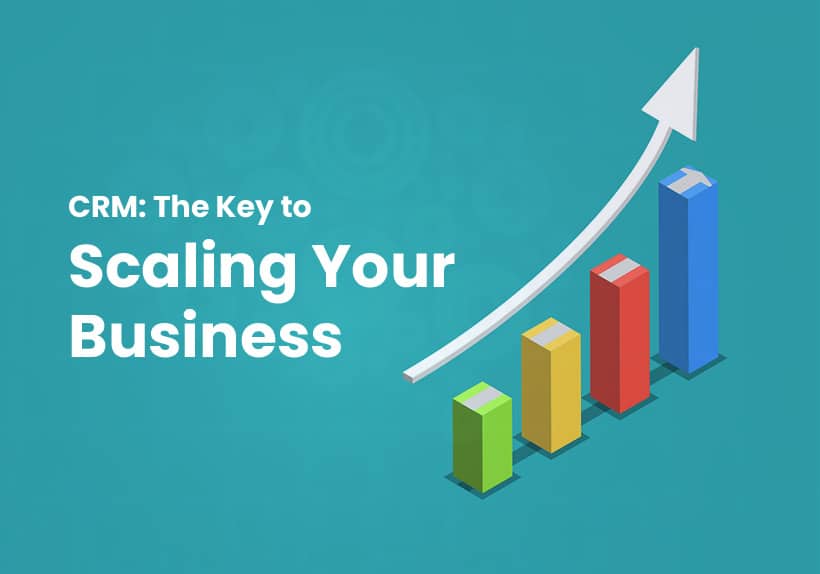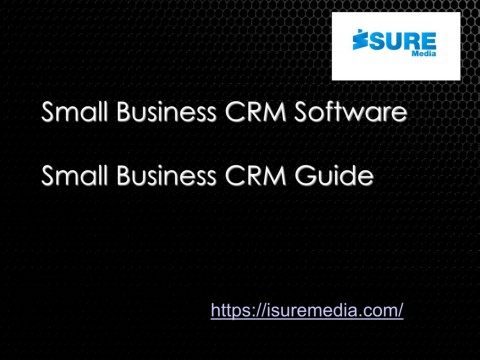
Small Business CRM Scalability in 2025: A Roadmap to Success
The landscape of business is constantly evolving, and for small businesses, the ability to adapt and scale is more critical than ever. In the coming years, particularly by 2025, Customer Relationship Management (CRM) systems will be at the forefront of this evolution. This isn’t just about managing customer data; it’s about creating a sustainable foundation for growth. This article delves into the intricacies of small business CRM scalability, exploring the challenges, solutions, and future trends that businesses need to understand to thrive.
Understanding the Core of CRM Scalability
At its heart, CRM scalability refers to a CRM system’s capacity to handle increasing workloads, data volumes, and user numbers without compromising performance. For a small business, this means the CRM should grow seamlessly as the company expands, accommodating more customers, sales representatives, and marketing campaigns. A scalable CRM ensures that the initial investment continues to deliver value, rather than becoming a bottleneck.
Why is scalability so important? Imagine a scenario where your business experiences a surge in customer acquisition. If your CRM can’t handle the influx of new data and interactions, you risk losing valuable customer information, slowing down your sales process, and ultimately, damaging your customer relationships. A scalable CRM prevents these issues, ensuring that your team can continue to provide excellent service and manage customer interactions efficiently, no matter the volume.
Key Challenges in Small Business CRM Scalability
Small businesses often face unique challenges when it comes to CRM scalability. These challenges can be broadly categorized as follows:
- Data Volume and Storage: As your customer base grows, so does the amount of data you need to store and manage. This can include customer contact information, purchase history, communication logs, and more. Managing this data efficiently requires a CRM that can handle large volumes of information without slowing down.
- User Adoption and Training: Implementing a new CRM system or scaling an existing one requires proper training and user adoption. If your team isn’t comfortable using the CRM, or if the system is difficult to navigate, it can hinder productivity and reduce the benefits of the system.
- Integration with Other Systems: Small businesses often rely on a variety of tools, such as email marketing platforms, accounting software, and e-commerce solutions. The CRM needs to integrate seamlessly with these systems to provide a unified view of the customer and streamline workflows.
- Cost Management: The cost of a CRM system can quickly become a burden for small businesses. As you scale, you need to be mindful of the costs associated with additional users, storage, and features.
- Customization and Flexibility: Every business is unique, and your CRM needs to be flexible enough to adapt to your specific needs. This includes the ability to customize fields, workflows, and reports to align with your business processes.
Addressing these challenges is crucial for small businesses looking to scale their CRM. Without proper planning and implementation, the CRM can become a hindrance to growth rather than an enabler.
Essential Features for a Scalable CRM in 2025
As we move towards 2025, the features that define a scalable CRM are evolving. Here are some essential features that small businesses should look for:
- Cloud-Based Architecture: Cloud-based CRM systems offer several advantages in terms of scalability. They allow you to easily increase storage, add users, and access the system from anywhere with an internet connection. This eliminates the need for expensive hardware and IT infrastructure.
- Automation Capabilities: Automation is key to streamlining processes and improving efficiency. Look for a CRM that can automate tasks such as lead nurturing, email marketing, and sales follow-ups. This frees up your team to focus on more strategic activities.
- Mobile Accessibility: In today’s mobile-first world, it’s essential to have a CRM that’s accessible on mobile devices. This allows your sales team to access customer information, update records, and manage their pipeline from anywhere.
- Reporting and Analytics: A good CRM should provide robust reporting and analytics capabilities. This allows you to track key metrics, identify trends, and make data-driven decisions. Look for features such as customizable dashboards and real-time reporting.
- Integration with AI and Machine Learning: The integration of AI and machine learning is transforming the CRM landscape. AI can automate tasks, provide insights, and personalize customer interactions. Look for a CRM that leverages AI to improve your sales and marketing efforts.
- Data Security and Compliance: Data security is paramount. Ensure your CRM has robust security features, such as encryption, access controls, and regular backups. Also, make sure the CRM complies with relevant data privacy regulations, such as GDPR and CCPA.
These features, when combined, provide a solid foundation for a scalable and effective CRM system that can support your small business’s growth trajectory.
Choosing the Right CRM for Scalability: Key Considerations
Selecting a CRM system is a critical decision. Here are some key considerations to guide your choice, particularly with scalability in mind:
- Assess Your Current and Future Needs: Before you start evaluating CRM systems, take the time to assess your current needs and anticipate your future requirements. Consider your sales process, marketing strategies, customer service workflows, and growth projections.
- Define Your Budget: CRM systems come in a variety of price points. Determine your budget upfront and stick to it. Consider the total cost of ownership, including implementation, training, and ongoing maintenance.
- Evaluate Different CRM Providers: Research different CRM providers and compare their features, pricing, and scalability options. Read reviews, compare pricing, and consider the long-term value offered by each platform.
- Consider Ease of Use: The CRM system should be easy to use and navigate. Look for a user-friendly interface and intuitive features. Consider the learning curve for your team and the availability of training and support resources.
- Prioritize Integration Capabilities: Ensure the CRM integrates with your existing tools and systems, such as email marketing platforms, accounting software, and e-commerce solutions. This will streamline your workflows and provide a unified view of the customer.
- Plan for Implementation and Training: Implement the CRM with a clear plan, including data migration, user training, and ongoing support. Develop a comprehensive training program to ensure your team is comfortable using the system.
- Prioritize Scalability Options: Ensure the CRM offers scalable options, such as the ability to add users, storage, and features as your business grows.
Making the right choice requires careful consideration and a strategic approach. This sets the stage for successful implementation and sustainable growth.
Best Practices for Implementing a Scalable CRM
Once you’ve chosen a CRM, successful implementation is key to realizing its benefits. Here are some best practices to follow:
- Data Migration: Carefully plan your data migration process. Clean and organize your data before migrating it to the new CRM.
- User Training: Provide comprehensive training to your team. Make sure everyone understands how to use the system and how it supports their day-to-day tasks.
- Customization: Customize the CRM to meet your specific needs. Adapt fields, workflows, and reports to align with your business processes.
- Integration: Integrate the CRM with your existing tools and systems. This will streamline your workflows and provide a unified view of the customer.
- Regular Audits: Perform regular audits to ensure data accuracy and system performance. Make sure the CRM is meeting your needs and adapt your approach as needed.
- Ongoing Support: Provide ongoing support to your team. Address any questions or issues promptly and provide regular training updates.
- Monitor Performance: Track key metrics to measure the CRM’s performance. Identify areas for improvement and make adjustments as needed.
These best practices will help you maximize the value of your CRM investment and ensure a smooth transition.
CRM Scalability Trends to Watch Out for in 2025
The CRM landscape is constantly evolving, and several trends are expected to shape the future of CRM scalability by 2025 and beyond:
- Increased Focus on AI and Machine Learning: AI and machine learning will play an even greater role in CRM systems. Expect to see more automation, personalized customer experiences, and predictive analytics.
- Enhanced Personalization: CRM systems will become even better at personalizing customer interactions. Expect features like hyper-personalization, personalized recommendations, and tailored customer journeys.
- Integration of IoT: The Internet of Things (IoT) will continue to integrate with CRM systems, providing valuable data about customer behavior and preferences.
- Rise of Low-Code/No-Code CRM: Low-code/no-code CRM platforms will become increasingly popular, allowing businesses to customize their CRM without extensive coding knowledge.
- Focus on Data Privacy and Security: Data privacy and security will remain a top priority. Expect to see more robust security features and compliance with data privacy regulations.
- Integration of Metaverse: While still nascent, the Metaverse could become a significant factor in customer experience, influencing how CRM systems engage with customers through virtual spaces.
Staying ahead of these trends will be crucial for small businesses looking to leverage CRM to drive growth. Adaptability and a forward-thinking approach will be key to success.
Real-World Examples of Scalable CRM Solutions for Small Businesses
Let’s look at some examples of CRM solutions that are well-suited for small businesses looking to scale:
- HubSpot CRM: HubSpot offers a free CRM that’s ideal for small businesses. It’s user-friendly, integrates with various marketing tools, and offers a range of features to help you manage your sales and marketing efforts. As your business grows, you can easily upgrade to paid plans with advanced features.
- Zoho CRM: Zoho CRM is another popular option for small businesses. It’s affordable, customizable, and integrates with a wide range of apps. Zoho offers a scalable platform that can grow with your business, making it a great choice for businesses of all sizes.
- Salesforce Essentials: Salesforce is a well-known CRM provider, and Salesforce Essentials is specifically designed for small businesses. It offers a range of features, including sales and marketing automation, and is designed to be easy to use and implement.
- Pipedrive: Pipedrive is a sales-focused CRM that’s ideal for small businesses. It’s easy to use and offers a visual sales pipeline that helps you track your deals and manage your sales process.
- Freshsales: Freshsales is a CRM that’s designed to be simple and intuitive. It offers a range of features, including lead management, sales automation, and reporting, and is a great choice for businesses looking for an easy-to-use CRM.
These are just a few examples of the many CRM solutions available. The best choice for your business will depend on your specific needs and requirements.
Conclusion: Embracing CRM Scalability for Future Success
CRM scalability is not just a technical consideration; it’s a strategic imperative for small businesses. By understanding the challenges, adopting the right features, and following best practices, small businesses can build a scalable CRM that supports their growth and enhances their customer relationships. The future of CRM is about more than just storing data. It’s about leveraging technology to create personalized customer experiences, automate processes, and gain valuable insights. As we move towards 2025, small businesses that embrace CRM scalability will be well-positioned to thrive in an increasingly competitive market. By investing in a scalable CRM, small businesses can ensure they are prepared for future growth, enhanced customer satisfaction, and sustainable success.
This roadmap provides a comprehensive guide to navigating the path of CRM scalability. By taking proactive steps today, small businesses can ensure they have the tools and systems in place to succeed in the coming years.
